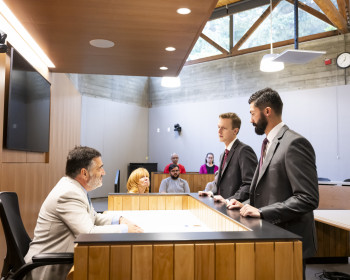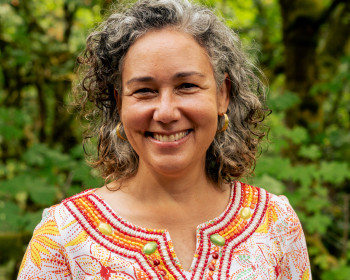Animal Law Litigation Clinic to Focus on Farmed Animals
Open gallery

The Animal Law Litigation Clinic (ALLC) at Lewis & Clark Law School is engaged in the plight of farmed animals and is the first and only clinic in the U.S. focused specifically on animal law litigation and on farmed animals. It is the second clinic devoted to animal law at the law school. The “Animal Law Clinic,” founded in 2008, serves as a comprehensive training ground for students interested in a full range of policy work.
The litigation clinic is led by noted animal law attorney Delcianna Winders, a leader in the animal law field. She previously served as Deputy General Counsel and Vice President for the PETA Foundation and Director of Legal Campaigns for Farm Sanctuary. (see related story)
“Farmed animals are in dire need of litigation on their behalf because they make up the largest number of animals that we interact with, are subjected to outrageously horrific conditions, and yet have the fewest legal protections of any animals,” Winders said. Winders notes that compared with all other animals U.S. citizens interact with—including those used for research, entertainment, to make clothing, and for companionship—farmed animals comprise 98% of human-animal interactions.
“The vast majority of these animals live their short lives in virtually unregulated, factory-style facilities where they are intensively confined and subjected to routine mutilations such as de-breaking, de-toeing, tail docking, and more—all without anesthesia,” adds Winders.
The clinic advocates for farmed animals in the courtroom through cutting-edge lawsuits to establish and expand legal protections and legal rights for farmed animals. Their work will include examining the presumption that common, inhumane farming practices cannot be legally challenged, and will pursue novel causes of actions to advocate for the interests of farmed animals.
The clinic chooses cases that will both maximize student learning opportunities and stand to make the most change for farmed animals. “We evaluate cases of egregious practices of institutional exploitation, individual neglect and abuse, zoonotic threats (diseases transmitted from animals to humans) created by intensive confinement of animals, as well as consumer protection issues and authorities who abrogate their responsibilities to protect animals under the law,” said Winders.
Students are involved in every aspect of litigation, including appearing in court on behalf of animals. “Students leave the clinic with a solid litigation foundation, including experience in assessing the merits and implications of potential lawsuits on behalf of animals and then zealously litigating the strongest cases,” said Pamela Frasch, Associate Dean and executive director of Center for Animal Law Studies (CALS).
The clinic is limited to six students per academic year.
* * *
For more than a quarter century, Lewis & Clark Law School has been the vanguard of animal law. Center for Animal Law (CALS) was launched a decade ago and offers the most extensive animal law curriculum in the world, with over 25 individual courses in animal law, as well as an Animal Law Certificate and the world’s only master of laws (LLM) in Animal Law. CALS is home to the Animal Law Review, the first legal journal devoted exclusively to animal law, L&C SALDF, the first student animal law organization, the world’s longest-running animal law academic conference, and the world’s first and only Dean of Animal Law.
Lewis & Clark Law School launched the first policy-focused Animal Law Clinic ten years ago, led by Professor Kathy Hessler. Continuing the trend of animal law ‘firsts,’ the Animal Law Litigation Clinic will be the first animal law clinic to focus exclusively on litigation.
Law Communications is located in room 304 of Legal Research Center (LRC) on the law Campus.
MSC: 51
email jasbury@lclark.edu
voice 503-768-6605
Cell: 626-676-7923
Assistant Dean,
Communications and External Relations, Law School
Judy Asbury
Law Communications
Lewis & Clark Law School
10101 S. Terwilliger Boulevard MSC 51
Portland OR 97219

